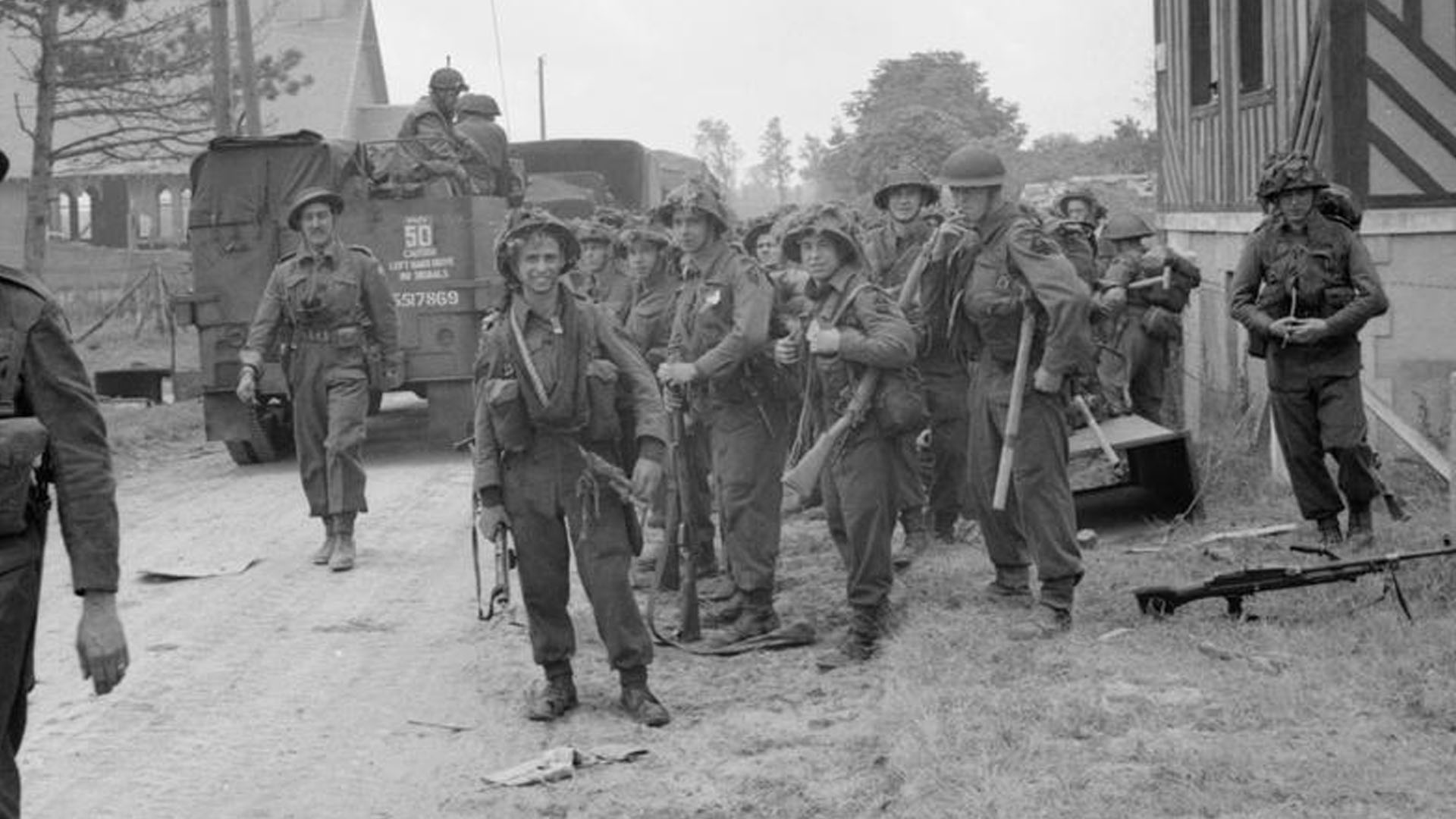Rifleman William James Moore served in 2nd Battalion Royal Ulster Rifles during the Second World War. Family and friends knew him as Billy. In later years, he spoke about his time with the Rifles in Normandy.
He enlisted in 70th Battalion Royal Ulster Rifles in June 1942 aged 18 years old. This was a battalion of young soldiers, too young to serve overseas. He took part in training in Essex before joining 2nd Battalion Royal Ulster Rifles. He continued training at Hawick, Scotland before his unit went to Inverary to carry out beach landing exercises in early 1944.
Normandy 1944
As D-Day drew closer, Moore went on to Droxford, Hampshire. For 3 weeks, they camped in tents. Security was tight and troops could not leave the camp. Visitors to the Droxford camp included Princess Elizabeth and General Montgomery. From there, 2nd Battalion Royal Ulster Rifles went on to Portsmouth, Hampshire where they made final preparations. After bad weather on 5th June 1944, the next morning saw William James Moore land with his battalion on Sword Beach, Normandy.
Landed half a mile from Sword Beach. We had no idea what it was going to be like. We were met with tanks and machine gun fire; they hit us with everything. We didn’t think there would be so much against us. I saw lads younger than me laying dead in the field with their kit around them. You would have thought they were sleeping.
Billy Moore interviewed in 2006.
He remembered the seas being rough and how many of the men did not make it ashore. Weighed down by heavy packs, ammunition, and fold up bicycles, many of them drowned on leaving the landing craft. Before they reached Cambes Wood on D-Day+2, Moore’s battalion lost over 180 troops.
I buried my mate at Cambes Wood. We were having a wee smoke and a wee pow-wow on the edge of the trench when we heard a shell coming over and jumped. He wasn’t quick enough and got it in the back. A lot of good mates were killed at Cambes Wood.
Billy Moore interviewed in 2009.
Outside Caen, 2nd Battalion Royal Ulster Rifles and a Canadian regiment waited as bombers attacked the town. The following day, they entered the town, fighting their way through the streets.
We travelled for another 250 miles to the River Seine and we had to create a bridge for the people coming after us. We were leading the way.
Billy Moore interviewed in 2006.
Lieutenant Cyril Rand’s regimental journal recalled William James Moore reading from the Bible to the men in Normandy/
At first, the episode struck me as rather incongruous: these soldiers, some of whom had a reputation for hard drinking and pay day brawling, who had probably only seen the inside of a church on church parades, had obviously been quite moved. I also said thank you to Rifleman Moore and, like the members of my patrol, I meant it.
Lieutenant Cyril Rand, 2nd Battalion Royal Ulster Rifles, Normandy 1944.
Return to Northern Ireland
Billy sustained injuries while serving in Belgium. He went first to a military field hospital before flying to Queen Elizabeth Military Hospital, Birmingham. He spent 7 months there before returning to Northern Ireland. He would not return to front line fighting and at home, received further treatment at Lagan Valley Hospital, Lisburn, Co. Antrim. For some time, Billy wore a caliper on his wounded leg.
Rifleman Moore continued to live in Lisburn, Co. Antrim after the Second World War. In 2006, he performed an official opening of a new lounge for the Royal British Legion in the town. He often spoke to groups and the media about his time on D-Day and in the Normandy campaign.
William James Moore died on 6th June 2009, the 65th anniversary of the historic D-Day landings. His funeral took place on 9th June 2009 in Lisburn Cathedral. In attendance were his wife Edna Moore and son Billy Moore. Reverend Canon Sam Wright and Reverend Canon Alex Cheevers conducted the service. Retired Major John Jamieson gave an oration. Members of the Royal Ulster Rifles Old Comrades Association carried the coffin behind a lone regimental piper. The Queen’s colours and the Royal Ulster Rifles standard covered the coffin.
